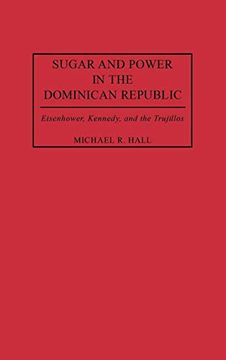Share
Sugar and Power in the Dominican Republic: Eisenhower, Kennedy, and the Trujillos (Contributions in Latin American Studies) (in English)
Michael R. Hall (Author)
·
Praeger
· Hardcover
Sugar and Power in the Dominican Republic: Eisenhower, Kennedy, and the Trujillos (Contributions in Latin American Studies) (in English) - Michael R. Hall
$ 78.95
$ 107.14
You save: $ 28.20
Choose the list to add your product or create one New List
✓ Product added successfully to the Wishlist.
Go to My WishlistsIt will be shipped from our warehouse between
Tuesday, June 25 and
Wednesday, June 26.
You will receive it anywhere in United States between 1 and 3 business days after shipment.
Synopsis "Sugar and Power in the Dominican Republic: Eisenhower, Kennedy, and the Trujillos (Contributions in Latin American Studies) (in English)"
A study of the powerful impact that sugar had on U.S.-Dominican relations as the primary vehicle of reciprocal manipulation from 1958 to 1962, Sugar and Power examines the development of the sugar industry in the Dominican Republic. Hall uncovers new evidence that supports the belief that U.S.-Latin American relations during this period were frequently a two-way street, with the United States reacting to Latin American initiatives just as frequently as Latin Americans responded to American initiatives. Both Eisenhower and Kennedy used sugar quota legislation as a foreign policy tool. At the same time, the Trujillo regime played upon Washington's fear of communism in response to the Cuban revolution to obtain an expanded sugar quota.Drawing heavily on U.S. and Dominican government documents, this study argues that the U.S. initiated economic sanctions against Trujillo to gain hemispheric support against Castro's Cuban revolution. Kennedy expanded those sanctions in an attempt to push the Dominican Republic along the path toward democracy. Although Juan Bosch's election at the end of 1962 and the allotment of a generous sugar quota indicated the apparent success of U.S. foreign policy toward the Dominican Republic, the overthrow of Bosch in 1963 indicated that the path toward democracy was longer than American policy makers had anticipated. This case study in the role of economic coercion in U.S.-Latin American relations during the Cold War tries to present a balanced account of both sides of the story.
- 0% (0)
- 0% (0)
- 0% (0)
- 0% (0)
- 0% (0)
All books in our catalog are Original.
The book is written in English.
The binding of this edition is Hardcover.
✓ Producto agregado correctamente al carro, Ir a Pagar.

